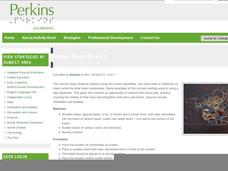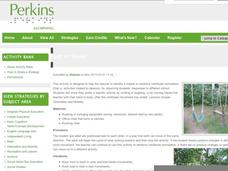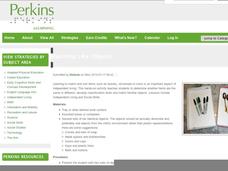TED-Ed
Different Ways of Knowing
“Words have colors, emotions, numbers, shapes, and personalities.” Daniel Tammet welcomes viewers to his world with a 10-minutes video that illustrates how he, as an autistic savant, perceives the world. Class members are then...
Curated OER
Ball Bounce Experiment
Students investigate different balls' abilities to bounce. They conduct a Ball Bounce Height Comparison and Ball Bounce Time Comparison, complete a worksheet, graph the results of their experiment, and answer investigating questions.
Curated OER
Let's Focus on Idioms
Get online and explore idioms. Your class will use the Internet to locate, choose, and illustrate their favorite idioms. They make a class PowerPoint with illustrations for their idioms and explain the meaning of each. A great way to...
Perkins School for the Blind
What Do I Hear?
Being able to give positive reinforcers to a child starts with knowing what the child likes. Intended for children with blindness, this lesson gives you a way to determine the types of music your learners like best. You are given a...
Perkins School for the Blind
Grocery Shopping
Grab those reusable bags, it's time to go shopping! Intended to foster independent living skills in learners with visual impairments, the lesson covers several topics related to grocery shopping. They start by planning a meal, reading...
Perkins School for the Blind
The Country Egg
Because most children with visual impairments don't reach and grab things at a young age the way sighted children do, they need additional supports to build up their fine motor skills. Here, they work on the pincer grasp, using their...
Perkins School for the Blind
Taking Turns
For small children or learners with disabilities, learning to wait patiently and taking turns is very important. In pairs, two children with visual impairments take turns asking for, waiting for, and playing with a musical...
Perkins School for the Blind
Learning to Identify Sounds Made by the Body
Sneeze, snap, tap, and whistle; Did I do that? Explore the parts and sounds of the human body with your learners with visual impairments. First you'll name the parts of the body, make a sound with each part, and then have the class...
Perkins School for the Blind
Initial Consonant Activity
Bingo is a super fun game and can be used to reinforce a vast number of recognition skills. These bingo cards are prepared by constructing nine squares, each delineated with raised Wikki Stix or gluedyarn and containing a...
Perkins School for the Blind
Hat Game
Sometimes the simplest ideas foster a lot of different skills. To boost social skills, group participation, identifying others by name, and dressing skills, learners play the hat game. They take turns wearing a hat while...
Perkins School for the Blind
Put the Shoe on Your Foot
Promote clothing identification, body part identification, and dressing skills acquisition with a fun and lively game. Each child takes turns grabbing a clothing item from the central clothing box. As he puts the item on, he sings,...
Perkins School for the Blind
Circle Time
Oftentimes children or teens with one or more disability are reluctant to participate in whole-group activities. Foster good participation, verbal expression, and social skills through daily circle time activities. Each day you and...
Perkins School for the Blind
Personal Information
"Hi, how are you? My name is___." Seems simple enough but it's not always that easy to recall and relate factual information about yourself. Learners with multiple disabilities practice memorizing and relaying personal information about...
Perkins School for the Blind
Build a Word
Get out those scrabble tiles and a braille tape labeler because today we are playing a build-a-word game! Label several sets of scrabble tiles using the braille labeler, place them in a box, and have children take turns pulling letter...
Perkins School for the Blind
Wheel of Fortune Game
Games are great for practicing any number of basic skills. Here is a set of wonderful instructions for making a braille version of a spinning game, where children win points by correctly reading/identifying the high-frequency words the...
Perkins School for the Blind
Rubber Band Stretch
If you don't teach blind or visually impaired students, this lesson may seem a bit strange. But, it helps them develop motor skills, orientation and movement skills, and listening skills, while building a better understanding of...
Perkins School for the Blind
Adapted Sorry Board Game
Board games are great for building social skills and for fostering recreation and leisure skills! Here, you'll find an image and a brief description of how you can make a tactile version of the game Sorry for your blind or...
Curated OER
Fast or Slow?
Vestibular stimulation is an action or activity relating to balance and motion. To find out what kind of vestibular stimulation your learners with multiple disabilities enjoy best, follow these simple suggestions. You engage the child in...
Perkins School for the Blind
Rolling Along
I cannot stress enough how important orientation and mobility training is for learners with visual impairments. To practice maintaining their balance, as well as work on building the confidence to participate in recreational sports,...
Perkins School for the Blind
Beanbag Toss
Why is learning how to catch and toss so important? If one has visual impairments, learning this basic skill will help him increase orientation and mobility, coordination, and cognitive development,. Mastery of this skill will also mean...
Perkins School for the Blind
Matching Like Objects
Same and different, sorting, and tactile discrimination are what's on the agenda for today. The class practices sorting objects and attempts to determine which objects are the same and different and why. The purpose is to increase...
Perkins School for the Blind
Packaging Snacks
Have your learners with special needs practice cooperative work skills, teamwork, and packaging. The kids will form an assembly line. Each pupil will add an item to a paper bag and then hand it off to the next person until the bag is...
Perkins School for the Blind
Bagging Groceries
Bagging groceries is a skill that can help learners with visual impairments understand organizing, problem solving, and weight discrimination. In addition, it is also a wonderful job skill. Help learners as they determine how to bag...
Perkins School for the Blind
A Visit to the Doctor
Going to the doctor's office may be a source of stress and uncertainty for some children. Help your learners with special needs discover what to expect at and how to cope with their next trip to the doctor. They explore real medical...

























